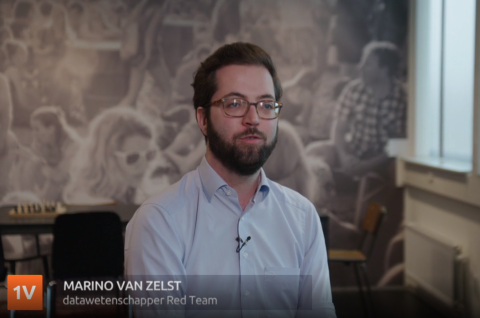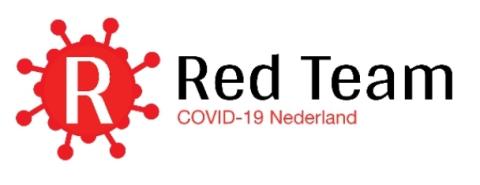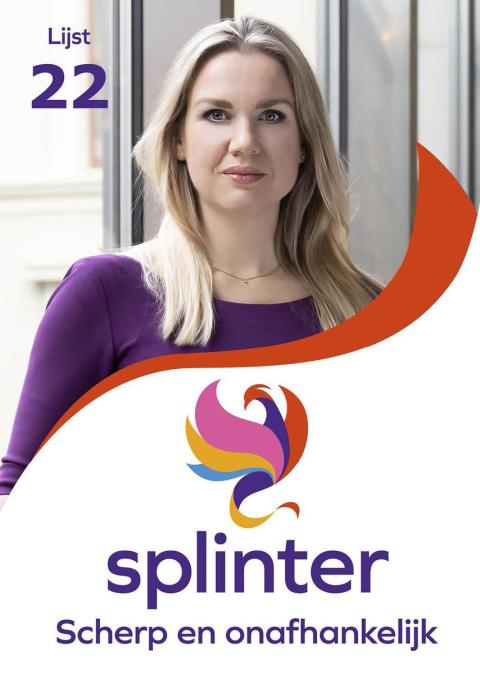Marino's passion for data also got him a dream date
The Red Team gives unsolicited advice to the Outbreak Management Team (OMT), which resulted in, among other things, a change in the mouth-nose cap policy. But that is not enough as far as Marino van Zelst is concerned. The young passionate organization scientist is a member of this critical covid alarm team as 'Chief of Figures'. On Twitter he has over 18,000 followers. An update with the man who, through his love for data, also found his dream date in the Red Team.
Meanwhile, Marino (30) presents all kinds of data, statistics and signal values on his channel: infections, mortality rates, hospitalization, ICU admissions and vaccinations, etc. The so-called signal values of the roadmap.
You tweet a lot. More than 43,000 tweets by now. How are you doing?
"I'm fine. I keep myself off the streets. That seems to be the intention. But of course, like everyone else, I want it all to be over quickly."
Did the pizza delivery guy come by more often?
"Well no, I don't eat above average from the home delivery now. I'd like to cook myself, and cooking is also a moment of peace, in the meantime I listen to a podcast or make a phone call."
How many hours do you spend in front of computer screens?
"Well, could be up to 60 hours a week. A lot is regular work, teaching mostly, and research within the Department of Organizational Sciences. One and a half days a week I work on my dissertation. The remaining hours, evenings and weekends, are largely spent on calculating, catching up on reading, consulting, all linked to corona."


How did you end up on the Red Team?
"The RIVM stopped publishing daily updates at the end of June but the open data remained available. I just wanted to know those updates myself, and since I am reasonably well in programming I started working on them myself. Besides, I was already working on mortality analyses. After I posted my own updates on Twitter, together with Edwin Veldhuizen, things started to roll. Especially when I discovered an error in the 'official' updates. The newspaper NRC published about it. Short after I was asked to join the Red Team. They needed someone who was good on strategy, and handy with figures and data. They now informally call me 'Chief of Figures', haha."
Has much changed for you since then?
"If you had told me in 2019 that I would be appearing in the media every week in 2020 I would have laughed at you. Furthermore, I have met many new people from other fields, including my current girlfriend, also a member of the Red Team. Without the pandemic, I would not have met her."
The relationship started online because the Red Team meets online only via Zoom; all members take corona very seriously. Meanwhile, they are dating 'offline' as well. About this love affair Marino does not make a fuss. Nurse practitioner Ipie33 , 'Chief of Care' in the Red Team, has been prominent on his twitter account ever since.
Chief of Figures and Chief of Care met each other in the Red Team

Tweet from Marino
@Ipie33 is doing covid care almost every day, so she is one of the very last care workers who is on the front line and therefore can only be vaccinated now. Super.
Personal note: since @Ipie33 and I got into a relationship during the lockdown, this is our first outing together. Good story for later: our first date is at a GGD vaccination site. Romantic (smiley).
Have they come to appreciate you more?
"I have always received appreciation for my scientific work from my colleagues. But the outreach to the outside world has definitely increased logically. It's nice that people appreciate you for explaining complicated issues, and then respond with 'Aha, now I understand.'"
What has the government done with your advice?
"Not much. They will have read the reports, but not so well otherwise they would have listened more. Our advice on the use of mouth-nose masks did have an effect."
R = Zero
"In countries like New Zealand, Taiwan, or Vietnam, a successful Zero Covid policy has been implemented with an R=0 policy. These countries don't accept any contamination. No R above zero. No risk of exponential growth. And zero simply cannot grow exponentially. Here the government opted for a flatten-the-curve strategy. Then you keep muddling around."
The three pillars of Dutch policy have all failed
"If you look at the three pillars of Dutch policy, you can only conclude that the cabinet has failed, for six months now. Pillar one, protecting the vulnerable: failed. Pillar two, not overburdening healthcare: failed. And three, keeping track of the virus: failed. If the strategy remains: we accept infections a little bit, and we intervene when the hospitals fill up, we will still have problems in the summer."
What's the bottleneck?
"The bottleneck is personnel. You can pull open a tin of oxygen, machines and beds, but a tin of nurses, you can't. If you want to steer on capacity, along the lines of 'we can handle 400 covid patients' - then at the same time you say 'It's OK that 400 people are running around the hospital gasping for oxygen.' And that's not OK. And what about the long-covid problem? It is seriously underestimated. We see a large group of patients who keep suffering from all sorts of symptoms for a very long time. Some patients are still half functioning after a year."
And the ethical discussion: who do you treat and who do you not?
"You can avoid the whole discussion. Don't let it get that far. The sooner you intervene harshly, the sooner you prevent those ethical issues. I prefer talking about steering by performance indicators."
You can pull open a tin of oxygen, machines or beds, but not a tin of nurses
Roadmap
The Ministry of Health, Welfare and Sport already invited Marino before to present his knowledge at the dashboard expert table on the question: how do you actually steer on signal values, because that is what a dashboard is all about.
Marino: "A dashboard shows you how things are and where you are going. The dashboard combines the function of the roadmap and the dashboard instruments in very simple overviews. If the gauges are here, we are there on the roadmap, you must do this. That went wrong in this corona crisis. You should provide long-term perspective. The final goal on the dashboard is not clear, neither is the communication about it. I tried to explain that to Hugo in a pitch using my own holiday experience as a little boy."
What is a dashboard all about? I explained that to Hugo based on my holiday experience as a little boy

All right, you're going on vacation...
"I told the minister that we used to go on vacation by car to Spain or Italy every year. Then I would regularly ask my mother, 'Are we almost there?' My mother allowed me always to take a look with her on the roadmap. 'Look', Mom said, 'we're here now. From there we drive this way and then we'll stop over there and will eat a sandwich. After another 2 or 3 hours we will arrive at out destination, and there you can go to the swimming pool.' I was reassured for an hour or so before I wanted to know once again if we were almost there. Mom showed the map again and pointed out exactly where we were."
Signal values
"The current corona dashboard does indicate extensively how fast we are driving and in which gear, but not whether we can accelerate or should brake, and especially not: when will we arrive at our destination? That is not visible. A random citizen has no idea how things are going and what the final goal is. I'm exaggerating, but what people see on the dashboard are a lot of speedometers and hectometer posts - signal values - which they cannot link with the route we're all driving."
"The government uses targets you don't want to meet, like a certain level of hospital and ICU admissions. And when you get there, what's next? Hospitals become overcrowded and have to scale down regular care. We've been in that scenario for six months now. Regular care is running below 100 percent all along. Meanwhile, the roadmap has been adjusted more often than it has been used. As a result, people think the roadmap is negotiable. There is too much room for discussion. Doing so, we don't know where we stand. 'Yes, that's politics,' Hugo de Jonge replied."

What did you advise Hugo?
"I suggested to the minister: (1) Provide an overview on the main page with very clear indicators that show where we are moving based on signal values. Simply put: show in numbers and graphs when I will get my croquette sandwich. (2) Show the dashboard at press conferences and make clear: this is where we are now, this is where we should go and this is what we need to do. That way you offer perspective. (3) Make sure the dashboard is fun through gamification elements. For example: a 'when-is-it-my-turn' calculator for vaccinations. (4) Provide additional figures: vaccination rates (main page), info on long-covid, possible side effects of measures."
"You can prevent all these discussions by intervening harshly, the sooner the problems are solved. React too late and things get out of hand due to the exponential growth of the virus. Besides, intervention is becoming more and more expensive. You could wait, as we saw in September, because the infections were not so gigantic yet, take a measure here and there, close cafes a little earlier, but ultimately such a virus continues to spread. So, if you wait too long, rough measures have to be taken, hard lockdowns and the like."
It's all about people's behavior, though.
"Yes. People's behavior and policy. The two always go together. And communication. The latter is not my specialism, but I've learned a lot about it in the meantime."
Are vaccines the solution?
"The figures show that they are starting to do well in groups that have already been vaccinated. Infections are declining in nursing homes and in the group elderly of 80 and older. Mortality rates are starting to go down there due to vaccinations. Once the 40-50 group is vaccinated, you will see more infections in the group below that. And once the 30-40 group is vaccinated, hospitals get full of people in their twenties. That's happening in Israel and England, where groups ending up in hospitals are now getting younger and younger. Here, everyone should have had their first shot as of July. That gives hope for the summer. But the pressure on hospitals will remain high for the next two months."
Why can't patients lying in hospitals be vaccinated?
"If you are infected, it won't work. A vaccine should prevent you from getting sick, but you are already sick. It also takes a while before the vaccine is effective. The time a patient stays in hospital and the length of treatment are shorter than the time the vaccine is effective."
What arethe consequences of the problems with AstraZenica?
"The result is that about 300,000 people will get their injection later. It will lead to x more infections, more hospitalizations and perhaps more deaths we could have prevented."
Some people say the excess mortality is not so bad. What do you think?
"No. Not at all. Excess mortality is ten percent higher than expected. Statistics Netherlands (CBS) predicted 154,000 deaths for 2020 without corona. The number of deaths now numbers 169,000, despite all the measures taken. No, the excess mortality is huge."
And without measures?
“A study published last month stated the lockdown during the first wave led to 124.000 less deaths in the Netherlands. The RIVM and CBS even came to 134.000.”[1]
Change the strategy into ZeroCovid and we won't need all the fuss of test certificates
The situation in Brazil is very bad. Do you trust the corona figures in countries like Russia or Brazil?
"I suspect there are actually more infections than reported. The same goes for mortality. I think you have to multiply those figures by 1.5. Russia did increase the mortality rate by a factor 3 a few months ago though."[2]
How do you assess the situation in the U.S.?
"It seems to be going in the right direction. Problem is you're talking about 50 'countries', each with their own policies. Those stay-at-home orders are the governor's job. There are also a lot of differences between states. But vaccinations are going very fast now. That's positive."
Twitter is intervening in the 'big lies'. Good or bad ?
"That's a tricky and complex issue. I'll pass."
Negative test or vaccine certificates for bars, restaurants or events. Agree?
"Not my cup of tea because of the privacy aspect. It looks like a trick to filter out infected people while we do not even know to what extent vaccines are effective. You don't need such proof when you eliminate the virus. As said: change the strategy to Zero Covid, then in three months' time we won't need all the fuss of test evidence at all. Yes, I'm optimistic about that."
Ever been tested?
"Yes. Negative. I had some symptoms that could indicate corona."
Are you going to get vaccinated?
"As soon as I get the invitation I'll go. No doubt."
Do you prefer a particular vaccine?
"You cannot choose in the Netherlands. Approved vaccines by the US Food and Drugs Administration (FDA) or the European Medicines Agency (EMA) are OK. If I could choose, I'd prefer Pfizer. Pfizer is very effective in Israel in terms of protection. But all vaccines prevent mortality, ICU admission and severe symptoms."
Prick fear?
"Not at all."
Did you vote?
"Sure. I wanted to vote with my FFP-2 mouth-nose mask on, which offers much better protection than 'the sock' most people wear. The FFP-2 and -3 also offer good protection in healthcare. I was curious what would happen if I kept the mask on while voting. The policy on this was not clear. But I was allowed to keep the mask on."
Marino motivated his political choice on Twitter. He voted for Femke Merel van Kooten, leader of the political party Splinter, and tweeted the following:

Ten years ago Rutte's 'Green Right' did appeal to me: free market, innovation, and a firm commitment to green politics. But the liberal party VVD is disappointing and the other parties on the right even more. Bit of a shame since I see myself as economically right-wing.
At @SplinterNL I found what I was looking for: good understanding of systemic risks looking at pandemic policy, defense and climate. EU critical, stimulating local initiatives and progressive. I take the economic leftism for granted, there's no other way :) That's how you end up with a left-wing progressive party as a right-wing progressive.
For the moment, @SplinterNL is the most optimal choice on the national level. And @FemkeMerel is an excellent controlling politician and that's nice too :) And for the first time in my life I voted for a female party leader, and it was about time!
PS. Femke Merel got 30,328 votes; not enough for a seat in parliament (69,486 votes needed)
When will we go to normal?
"That's all speculation. And what is normal? If corona becomes endemic or a seasonal virus, like influenza, the summer could be normal. We probably get peaks in the winter, and then we put the masks back on. It also depends on how covid is being reduced globally, also in poorer countries. Surpressing the virus well now is good for the long term. And with vaccination programs we will get things back on track quickly. A year like 2020 we're not going to see again."
"Yes, I do want to go back to the office. Miss my colleagues. Nice people. Thinking together about wild research ideas. Informal chats. Under these circumstances you consciously approach one another. That's quite a different dynamic. But it is obvious that we are going to work more from home. One or two days a week, I have no problem with that."
A year like 2020 we're not going to see again
What is your thesis about?
"My specialism is steering by performance indicators. That's what my dissertation is about. What kind of performance goals are being set by organizations and how can they be achieved? Suppose, a company sets a certain goal, for example, five percent profit, but only two or three percent has been achieved? What to do? I am looking at past performance, future expectations, how other companies are doing, and how goals are being adjusted?"
A sneak preview?
"One lesson is: respond quickly to a problem. The longer you wait the faster you will get into trouble. That's exactly what we saw with corona. The virus was getting closer and closer, but we thought it will not go that fast. Wrong. If a more rigorous intervention was carried out in March, we would not have ended up in this misery. In the second wave, the same thing happened. We should have learned from the first wave. A country like Taiwan did learn from SARS and intervened early and hard on covid. Look at the result. Society is running again for quite some time now."
Inspectorate of Education
"In my dissertation, I look in particular at schools, at indicators such as student numbers, pass rates, demographic factors, prognoses. That is quite complex as well. In addition, a school has to deal with the Inspectorate of Education. Inspectors assess schools on intake, outflow, throughput. It is a balancing act for schools to keep all these indicators above certain signal values."
"Schools have a whole set of knobs and buttons at their disposal. We call it 'gaming the metrics.' For example, push a little on the pass rate button (make it harder for students to pass, better students move on) leading to a higher pass rate in the last exam class. You can't do that too long since the Inspectorate is watching. I discussed this with school directors, presented different scenarios and played with their indicators. I conducted quantitative analyses and qualitative interviews with school principals and chairmen of the board."
Tilburg University has two buildings named after a Nobel laureate - Simon, Koopmans - but that doesn't count, haha
Is this approach also applicable to our university?
"Yes. Our previous Rector Magnificus was aiming at an explicit goal: 20,000 students within five years. What sort of indicators do universities have? For example, research and education rankings. What is the score in the various rankings and is it possible to steer on that? Tilburg will not score on an indicator like the 'number of Nobel Prize winners'. We do have two buildings though, named after a Nobel Prize winner - Herbert Simon, Tjalling Koopmans - but that doesn't count, haha."
Marino's PhD defense will take place at the end of this year. Supervisor is professor Federica Angeli (a former colleague, now working at York University, UK). Marino's contract expires at the end of August 2021. And then? "I tend towards the Academia because I really enjoy teaching and doing research. I have also taught in a high school before. But having impact, I've noticed, is also very nice. Besides, public health is an interesting field."
The Red Team C19NL
The Red Team wants to use expertise and relevant experience to contribute to the prevention and control of COVID-19. Starting point is the interruption of virus transmission within all groups of society. The Red Team is supported by data professionals who, on a voluntary basis, collect, analyze and interpret available data on a daily basis. They use information published by RIVM, NICE, LCPS, CBS and others. In addition, they analyze data from Google (trends/mobility), Apple (mobility) and various other sources to gain more insight into trends and the impact of corona measures. The Red Team chooses to function in the background. The government has opted for mitigation (soft policy). The Red Team opts for a fundamentally different strategy: Zero Covid.
Foot notes
[1] See Van den Hof c.s. and see RIVM en CBS.
[2] See f.e. British Medical Journal.
Date of publication: 12 April 2021
